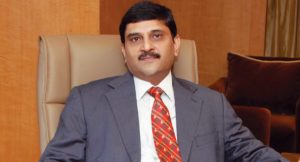R. Gopalakrishnan, non-executive director of Tata Sons, is also an author of many best-selling books. Among his recent launches is a book titled ‘Six Lenses- Vignettes of Success, Career and Relationships’ which draws lessons from his rich life experiences. Interestingly, luck is one of the six lenses in this book.
As the story goes
I am going to narrate a story here to explain this concept called ‘unearned luck’. During the early days of my career, in an interview with a Hindustan Lever panel, the marketing director asked me, an engineer, whether I would join the marketing department. I wasn’t too keen on doing so and did not take up their offer. Of course, they told me that I could approach them anytime if I got bored of computers, which I did, four years after the interview. But, they gave me the role of a salesman while all my contemporaries were brand managers. I thought it was bad luck and was not planning to stay on for too long. However, an incident that occurred during a national sales conference changed my mind. In the conference, I was not given any important task, but was asked to take care of the delegates. Before the event, a senior sales manager fell ill, and was unable to attend the conference and make his presentation. The Madras branch was caught unawares and they made me do the presentation with great apprehension. I was also quite nervous but I did the presentation well. It went off so well that I got visibility at the conference and my bosses also chose me for some key postings. Small incidents like this make a difference in one’s career. This is what I call unearned luck.
(Excerpts from his latest book: Six Lenses)
In another instance, when I was posted to Jeddah in 1990 as the chairman of Unilever Arabia, war clouds were gathering over Saddam Hussein’s belligerence with Kuwait. Many thought I was unlucky to be posted, at such a time, to what might become a war-ravaged geography. Indeed, on the morning of 12th January 1991, when I reported at London for my formal induction, the U.S. Congress passed a joint resolution authorising the use of military force to drive Iraq out of Kuwait. Operation Desert Storm had begun. Unilever Director Chris Jemmett, my boss, welcomed me on that cold, bleary January day of 1991 with the cheerful words, “Welcome, the war has begun.”
As I settled down to the tasks of the newly appointed chairman, travelling between London and Jeddah, the events of the war moved decisively. By 27th February, 1991, US Marines and Saudi Arabian troops had entered Kuwait city and engaged in what came to be known as the battle of Medina Ridge. Within a few days, Kuwait accepted the UN ceasefire resolution. The war was over.
There was massive government spending after the war throughout the Gulf Cooperation Council states. The economy became buoyant and greatly helped me establish Unilever’s Arabian business on a sound footing. Of course, there was earned luck insofar as Unilever had been preparing to invest in the geography for many years. But there was unearned luck given the economic boom that lifted Unilever’s efforts with a rising tide. And, since I happened to be the chairman, I got lucky as did my colleagues!
How you see it
(Excerpts from his latest book)
Good outcomes are dressed up as strategic strokes of genius; catastrophes are attributed to bad luck. The same holds true for an individual’s life. We are too easily misled by biographies of great people who claim to have meticulously planned their ascent. The origins of success are much too subtle and complex. Life does not follow a course and we change in many ways as we grow. We all feel that there is something called luck, but it is not fashionable to admit it.
Admitting the existence of luck demands the acknowledgement that some things are beyond our control and the control-freak side of human nature is never going to accept such an uncomfortable state of affairs without a fight.
Favourite quote on luck
“You know what luck is? Luck is believing that you are lucky, that’s all. To hold a front position in this race, you’ve got to believe that you are lucky.”- Marlon Brando as Stanley Kowalski in the 1951 movie A Streetcar named Desire
In a measure
There’s a saying that goes; there is no reality, only perception of reality. Luck is just like that. Luck gives that extra wind power to your effort. It gets you to your victory about 1/16th of a second before the other person and all victories are about that 1/16th of a second.
What’s your Plan L?
Planning to be lucky is not in our hands but believing that we are lucky is. In other words, having positivity is important. Luck is like the iron filing, it gets attracted to the magnet called positivity. Positive people seem to be more lucky than negative people. Negative people are more conscious of their bad luck while positive people derive their luck and they keep getting lucky.





